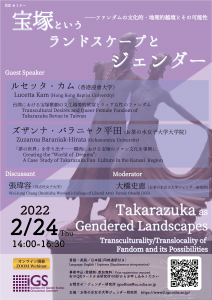 2022.2.24 IGS seminar “Takarazuka as Gendered Landscapes: Transculturality/Translocality of Fandom and its Possibilities”
2022.2.24 IGS seminar “Takarazuka as Gendered Landscapes: Transculturality/Translocality of Fandom and its Possibilities”
On February 24, 2022, the Institute for Gender Studies (IGS) hosted the online seminar “Takarazuka as Gendered Landscapes: Transculturality/Translocality of Fandom and its Possibilities”. Takarazuka Revue has long held the image as the “world of dreams” – a glamorous utopia offering Japanese women an escape from the everyday oppression of the male-dominated society. At the same time, researchers have often noted that Takarazuka is a theatre tightly controlled by patriarchal corporate structures working hard to preserve its brand as a bastion of female “modesty, fairness, and grace”. To discuss these clashing representations we invited two speakers, dr. Lucetta Kam (Associate Professor, Hong Kong Baptist University) and Zuzanna Baraniak-Hirata (PhD student, Ochanomizu University), with dr. Wei-Jung Chang (Assistant Professor, Doshisha Women’s College of Liberal Arts) providing comments and with dr. Fumie Ohashi (Associate Professor, IGS) serving as the moderator.
The first speaker, Lucetta Kam, gave a presentation on transcultural desires and lesbian fans of Takarazuka Revue in Taiwan. Takarazuka has had many generations of fans due to the country’s colonial past but the more recent Taiwan tours in 2013, 2015 and 2018 have renewed local interest in the company. In her lecture, Kam has shown that the new generation of queer fans of Takarazuka Revue in Taiwan actively engages in the production and articulation of queer readings and desires. This was made possible largely thanks to a reservoir of new resources made available by the local LGBTQ+/tongzhi movement and the formation of transnational Chinese language queer fan communities.
The second speaker, Zuzanna Baraniak-Hirata, gave a talk focusing on the domestic Takarazuka fans’ perceptions of Takarazuka Revue’s birthplace, Takarazuka City. Considered by many fans as the sacred site of Takarazuka’s fan culture, Takarazuka fans perceive the urban landscape surrounding the Takarazuka Grand Theatre as a geographic safe space and a place where female fans of Takarazuka can feel like they belong. By exploring fans’ relations and everyday interactions with this landscape, Baraniak-Hirata argued that the space is continuously created, maintained, and made significant by Takarazuka’s female fan network, becoming their own “ibasho”.
Wei-Jung Chang led the discussion following the two presentations. Drawing on her experience as a researcher and a fan of Japanese pop culture, Chang noted the diversity of fandom spaces which can take multiple forms ranging from fixed and limited physical spaces to abstract discursive spaces projecting individual fans’ practices or desires. In the context of Takarazuka’s fandom, the ambiguous and hybrid style of gender performance provides women with a secret space to enjoy their queer fantasies. Such interpretations have often become the topic of English-language studies on Takarazuka, but are rarely mentioned by scholars in Japan. Baraniak-Hirata talked about the difficulty of discussing queer readings with domestic fans as the unspoken rule of fandom is to never discuss such issues whether in relation to performance, performers or fans themselves. Interestingly, Kam said that this was also the case with her informants, many of whom have been marginalized from the mainstream Takarazuka fandom for their queer interpretations. This suggests that although queer fantasy spaces can exist within fan cultures, they can still be subject to social exclusion.
Another discussion point raised by Chang was the socio-cultural context of transnational fandoms and their impact on the acceptance of various popular culture trends. For example, while many Japanese pop culture genres have had a significant influence on Taiwanese society, other transnational fandoms such as Korean popular music have had a considerably lower impact. Kam commented that such varying degrees of acceptance may be based on generational differences. She argued that while Japanese popular culture has dominated East Asian markets in the 1980s and 1990s, after the 2000s South Korea has stepped up its exports of pop culture products which resulted in the younger generation being more familiar with Korean than Japanese pop culture. This has also been evident in Kam’s research of lesbian fans of Takarazuka in Taiwan, many of whom were working women in their late 20s to 40s.
We received many questions and comments from the audience, many of whom were interested in queer readings of Takarazuka, the characteristics of its female fandom or the results the coronavirus pandemic has had on the fan community. Given that Takarazuka Revue has been trying to attract international audiences in recent years, discussions about the diversity of interpretations or inclusivity of queer fans are needed to deeper our understanding of this transnational fandom and its popularity among female fans.
Reported by Zuzanna Baraniak-Hirata (Ph.D. student, Ochanomizu University)

